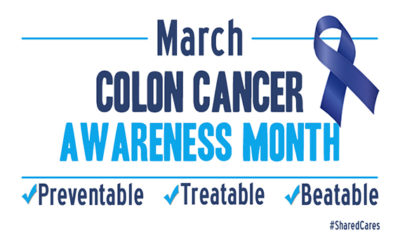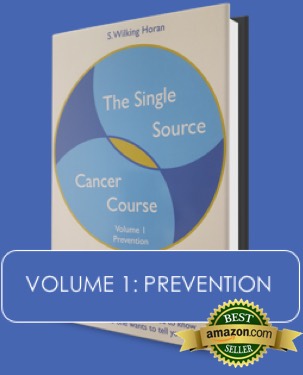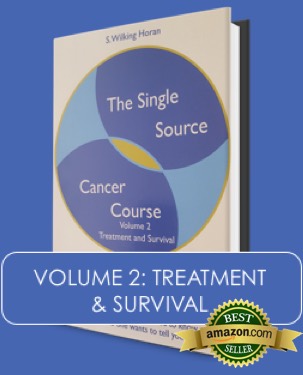 PREVENTABLE, TREATABLE & BEATABLE
PREVENTABLE, TREATABLE & BEATABLE
Hi everyone and welcome! March is COLON CANCER AWARENESS MONTH and, accordingly, we’re going to get to the bottom of this particular cancer with a review of its risks and the ways in which we can protect ourselves.
In the United States, COLON CANCER, which also is referred to as COLORECTAL CANCER, is the third most common and the third deadliest cancer for both men and women. Males have a one in twenty-two chance of developing colon cancer, while females have a slightly lower risk of one in twenty-four. And, this cancer typically affects individuals at an average age of around sixty.
Yet, there are always exceptions to the rule. For example, I was diagnosed with colon cancer when I was half the average age. I had a healthy lifestyle. My diet was good. I didn’t consume red meat. I was basically a tea-totaler. I practiced yoga and meditation. I had never used tobacco products. Colon cancer was the last thing I expected.
So, what happened?
In my case, I was caught completely off-guard because I didn’t know that colon cancer ran in my family. I didn’t understand the importance of hereditary factors in the development of this cancer. I didn’t know anything about my family medical history. As a result, I was blindsided — something I don’t want anyone else to experience.
Fortunately, colon cancer is one of the few cancers that can actually be prevented if you understand your risks and undergo the proper screening procedures. That’s right. Not just treatable. Not just beatable. But, preventable!
So, let’s review the 7 major risk factors for colon cancer of which everyone needs to be aware.
FAMILY HISTORY
Heredity may be the most powerful force in determining who’s at risk for colon cancer. If you have a first-degree relative –a parent, sibling or child – who has had colon cancer you have an increased risk for the disease. If you have a family history of hereditary non-polyposis colon cancer (HNPCC), MYH-associated polyposis or familial adenomatous polyposis you also have an increased risk for colon cancer.
PERSONAL HISTORY
Women who have a history of breast, ovarian or uterine cancer share a higher risk for colon cancer.
PRE-EXISTING CONDITIONS
Women and men who have a history of colon polyps, ulcerative colitis or Crohn’s disease have an increased risk for this cancer. And individuals who have diabetes have an increased risk of thirty to forty-percent for developing colon cancer.
RACE & GEOGRAPHY
In the United States, African American women and men have the greatest risk for developing this cancer while Hispanics, Asian-Americans, Native Alaskans and Native Americans have the lowest risk. Around the world, the highest rates for colon cancer are found in the industrialized nations of the world, while the lowest rates are found in South America, Africa and Asia.
AGE
As with most cancers, our risk for developing this disease typically increases as we grow older. Unless hereditary factors are indicated, colon cancer typically strikes an individual at an average age of sixty.
 GENDER
GENDER
While this cancer is the third most common among both women and men, men have a slightly greater risk for developing colon cancer. Men also have a greater risk for developing cancer of the rectum.
LIFESTYLE
Lifestyle factors are a huge influence in one’s health and tobacco use, alcohol abuse, lack of exercise and excess weight contribute greatly to one’s risk for colon cancer.
Now, let’s review 5 great ways we can reduce our risk for colon cancer.
MAINTAIN A HEALTHY DIET
Increase fruits, veggies and lean proteins and reduce red meats and fatty foods.
FIND A HEALTHY WEIGHT
Consult your physician to determine the right weight for you.
EXERCISE
Even a few minutes each day will reduce your risk for this cancer and many others.
HYDRATE
Make sure you drink plenty of water.
ELIMINATE TOBACCO USE and ALCOHOL MISUSE
When we know our personal risks, and undergo the proper screening procedures based on those risks, we can actually prevent this cancer.
Yet, even if colon cancer is detected, ninety-percent can be successfully treated when caught early.
Knowing your risks and undergoing regular physical exams and screening procedures as determined by you and your physician can literally save your life. It’s COLON CANCER AWARENESS MONTH. So, don’t be afraid. Be informed. Knowing the facts can save your life!
Once again, thanks for joining me everyone. Until next time, stay safe, stay in GOOD HEALTH and . . .
TAKE THE COURSE AND TAKE CHARGE!



Leave a Comment